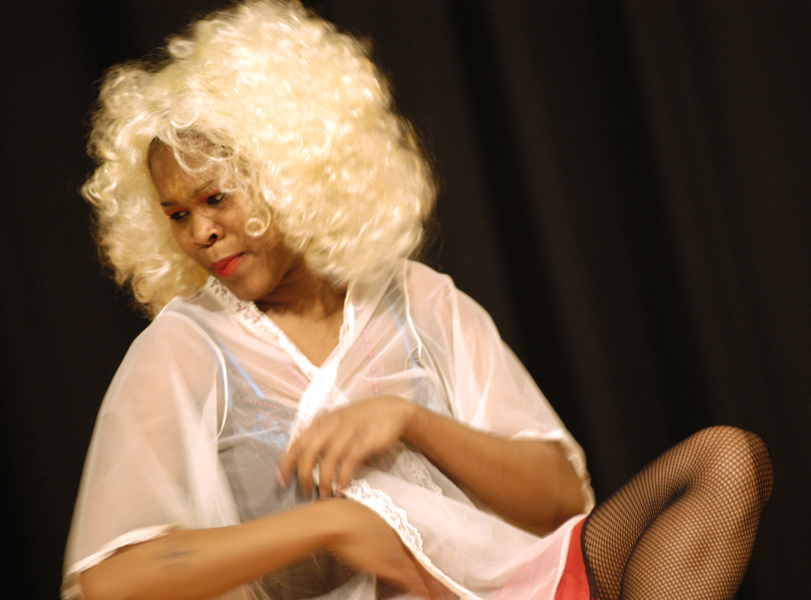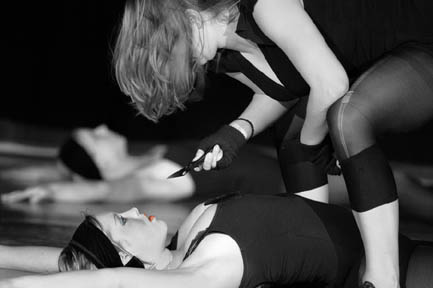Theater Review: No Mirrors in Duluth
Chris Godsey reviews Beatrice Georgialidis' show "This Room with No Mirrors." The show will reprise in Grand Marais and Minneapolis on dates to be announced.



Beatrice Georgalidis is tough not to notice in Duluth, Minnesota. Just that name, so flamboyant and not Scandinavian, is enough to set her apart. And when she’s waiting tables at Chester Creek Cafe, everything from her candor, which borders on abruptness, to the unapologetic confidence with which she carries her significant curves, says, “Yo! I ain’t from around here!”
Which makes sense, because until recently she was in New York City. According to a press release announcing her first play, the semi-autobiographical This Room with No Mirrors, Georgalidis, who spend a year as an in-house production coordinator at the Sundance Channel, “left behind a freelance producer’s career in film and television [her resume includes over 50 commercials and music videos] to pursue independent artistic endeavors in Duluth.”
The release does not explain why she made the move. But This Room illustrates, in a voice less direct and more visceral than public relations copy, the life Georgalidis lived before success came calling.
The oblique, translucent explanation starts in the program handed out at the stage door: after a page-long list of thank-yous—stuff like,“GABRIEL – YOU CAME TO DINNER AND CHANGED MY LIFE” and “DANNY – I KNOW YOU’RE OUT THERE”—a final note reads, “AND FINALLY NEW YORK. THANKS FOR KICKING THE SHIT OUT OF ME. I’M ALL BETTER NOW.”
This Room, staged in March in the Duluth Central High School auditorium (a nicer theater than you might expect), is the first artistic endeavor presented by Georgalidis’ new company, Suitcase Productions. She wrote, directed, and choreographed the often mesmerizing combination of modern and classical dance, literary monologues, projected images, and pre-recorded music by Sinead O’Connor, Bjork, Harry Connick, Jr., and other popular artists. Gabriel Long co-produced the show, which stars Shaunna Heckman as Whitey, the dramatic stand-in for Georgalidis’ experiences in The Big City.
Here’s the release’s synopsis: “Whitey has a subway map burned into her memory. She arrives in New York with two suitcases and two hundred dollars to attend a prestigious dance program. Sleeping only three hours a night, while working full-time as a waitress and attending classes, she quickly burns out. Her psyche fractures under pressure, and she loses control of her beauty, strength, sexuality, and grace. Her only friend, Ebony, is a six-foot-four exotic dancer with a son who goes looking for hope in a graveyard in Atlanta, Georgia.”
Whitey’s fractured self is represented by four dancers, one each for the qualities she’s lost, played by Kiersten Johnson, Krissy Fromm, Amy Jo Adelmann, and Jessie Elizabeth Hetland. Ebony is nicely embodied by Patrice Overton, although she only rarely appears, which means her power in Whitey’s life is mostly implied.
Ebony’s intermittence caused a disturbing—maybe annoying is more accurate– trend during the first Duluth Central staging: much of the crowd seemed to look past her potential for dramatic, emotional significance, because her sassy, sista-girl, “Oh no you di’n’t!” delivery was obviously interpreted as comic relief. She got a lot of laughs, even when her words and actions weren’t funny. Both Ebony and Overton are much more than that. Ebony should have had more stage time; the 99-percent-white Duluth audience should have known better. When challenged with responding thoughtfully to the entire play, a frustrating portion of the audience only legitimized the humanity of the characters whose faces looked like theirs.
The words and images and movements used to tell Whitey’s story are consistently intriguing (if occasionally unfulfilling to an audience raised on formulaic, triumph-of-the-human-spirit movies and traditional musical theater) for the show’s 80 minutes. Once or twice they’re trite and predictable; most often they’re bold and insightful. It all fits, because it reflects Whitey’s archetypal, three-act story: naive dreamer-girl takes on New York; dehumanizing disillusion ensues; world-weary phoenix-woman rises, wise and strong, from her own ashes. While narrating the play’s opening in her own voice, Georgalidis has to say “I left a boy for a city,” because only something so saccharine can prepare an emotional palate for bitterness like, “and I left the child in me for a whore.” Some of the dancing and acting have to be rough in one or two spots, because the life they’re representing was rough all over.
Beauty, Strength, Sexuality, and Grace spend most of the show in a variety of tight black outfits, dancing in discord with or opposition to one another—dashing at odd angles across the wide stage, only coming into contact when their disparate paths somehow coincide. They’re all beautiful, strong, sexual, and graceful, but each gets a solo in which her identity is emphasized. The most moving of those solos comes when the muscular, busty Fromm (as Strength) slashes about the stage in a mesmerizing rant through the Jane’s Addiction song “Ted, Just Admit It,” which repeats the line, “Sex is violent!” till it becomes an oddly comforting mantra. Her dance is equal parts sex and anger; are those what Whitey lost when she relinquished Strength? If so, what was lost when Sexuality went missing?
By show’s end, Whitey’s broken mind has healed. In a dance titled, “Under Something Beautiful,” Beauty, Strength, Sexuality, and Grace wear white. Even while facing away from each other, they move in concert. As projected images of Greenland mountains swoop toward some summit and the music is swirling and racing toward heights of its own, Grace is held aloft, parallel to the stage, by Beauthy, Strength and Sexuality. Whitey, in an enormous white dress with a 30-foot red train, glides across the back of the stage on the same sort of swing she must have ridden as a girl. All sounds and images are rising and flowing forward, including Ebony, who strides in to check on Whitey.
Much of what led Whitey to that point isn’t told; all of what happens to her after that is left a mystery. But head to the Chester Creek Cafe some time, and when Beatrice Georgalidis shows up to take your order, many of those missing details will make sense.
Photos by Jeff Peabody